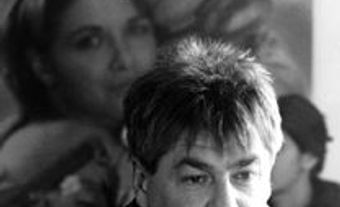The film Barney's Version (2010), produced by Robert Lantos and directed by Richard J. Lewis, takes on the challenge of adapting Mordecai Richler's unruly onslaught of a final novel. Overflowing with narrative and character invention, hilariously funny, profoundly sad, and everything in between, the book tracks a rogue's adventures from his bohemian youth in Europe to his waning, memory-haunted days in Montréal. Hopscotching around in time and place, Barney Panofsky narrates multiple story threads in a meandering stream of consciousness, recounting his 3 marriages, friends and enemies, triumphs and disasters.
Lewis's picture could not begin to capture the book's range and detail: the innumerable events of Barney's turbulent life, the swings between mocking contempt and graceful compassion, the digressions within digressions, and the riffs on everything from the Canadian film industry and Québec politics to kinky sex and Richler's beloved Montréal Canadiens. The film drops many of the book's secondary characters, sketches in figures like Barney's first wife Clara and transposes some of the relentless, satirical wisecracking into dialogue.
After reading what he called "an early copy" of the novel that Richler sent him, Robert Lantos bought the rights and worked for years with various writers, including Richler, to develop a script that condensed the novel while retaining its spirit. Lantos loved Barney's Version so much, he said that he would have liked to film the entire book "but that would have been 10 hours long." Lantos had previously adapted Richler's Joshua Then and Now (1985) after being introduced to the writer by Ted Kotcheff, who directed the film.
Eliminating voice-over narration that bogged down early drafts of the screenplay, writer Michael Konyves's version zeroes in on Barney's relationships with his adored third wife Miriam, with Boogie, the lifelong pal he may have murdered during a drunken altercation, and with his rambunctious ex-cop father, Izzy. According to Lantos, these relationships "form the spine of the movie, but they're also the spine of the book."
In the movie's core sequence, Barney falls head-over-heels in love with Miriam during his wedding to "the Second Mrs. Panofsky." As in the novel, the action encapsulates Barney: he's a crazily impulsive taboo-breaker with a deep romantic streak, capable of being as tender as he is cruelly indifferent to the suffering of others. For Lantos, the novel's biggest hook was this flawed "politically incorrect protagonist" who, like Richler himself, "did not fear social convention of any kind and was particularly harsh on the high and the mighty. He's someone who wears his flaws on his sleeve, and his flaws are badges of courage, the way I saw it, and see it now. Barney never hides what he truly believes and thinks."
Of the film's key performances, Paul Giamatti (Sideways, American Splendor) brings down-to-earth credibility to Barney's story arc from young manhood to burgeoning memory loss, with an assist from Adrien Morot's subtle, Oscar-nominated makeup. In a film that aims at sidestepping simplistic black and white views of life, Giamatti "looks and behaves like a prickly-pear," says Lantos about his lead actor. "Within the prickly-pear skin, there is a deep humanity and a tenderness."
Rosamund Pike (An Education, Pride and Prejudice) captures Miriam's radiant beauty and quick wit, while Minnie Driver (Good Will Hunting, Sleepers) gets under the skin of the Second Mrs P., a motor-mouthed Jewish American Princess. Casting coup Dustin Hoffman, who would have made a great Barney earlier in his career, is an organic match for Giamatti as the exuberantly disreputable Izzy, while Scott Speedman (Adoration, Good Neighbours) and Rachelle Lefevre (New Moon, Casino Jack) give Boogie and Clara edgy life.
After world-premiering at the 2010 Venice International Film Festival (the book has a cult following in Italy and one of the film's co-producers is Italian), Barney's Version picked up a best actor Golden Globe Award for Giamatti, Adrien Morot's Oscar nomination for makeup, 11 Genie Award nominations (winning 7), and in Québec, 4 nominations (winning 2) for the Prix Jutra.

 Share on Facebook
Share on Facebook Share on X
Share on X Share by Email
Share by Email Share on Google Classroom
Share on Google Classroom

